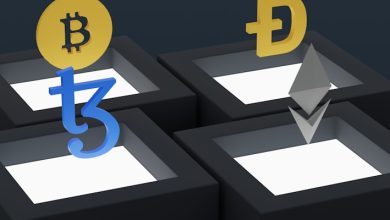The Basics of DeFi: A Guide to Decentralized Finance

- Understanding the fundamentals of DeFi
- Exploring the benefits of decentralized finance
- How DeFi is revolutionizing the traditional financial system
- Key concepts and terminology in the world of DeFi
- Risks and challenges associated with decentralized finance
- Steps to get started with DeFi platforms
Understanding the fundamentals of DeFi
Decentralized Finance, also known as DeFi, is a rapidly growing sector within the cryptocurrency industry. Understanding the fundamentals of DeFi is essential for anyone looking to participate in this innovative financial ecosystem. In simple terms, DeFi refers to financial services that are built on blockchain technology, allowing for peer-to-peer transactions without the need for traditional intermediaries such as banks or brokers.
One of the key principles of DeFi is the concept of decentralization, which means that the control and ownership of assets are distributed across a network of users rather than being held by a single entity. This decentralized nature of DeFi offers increased security, transparency, and accessibility compared to traditional financial systems. By leveraging smart contracts, DeFi platforms can automate processes such as lending, borrowing, and trading, reducing the need for human intervention and potential errors.
One of the most popular use cases of DeFi is decentralized lending and borrowing. Through platforms like Compound or Aave, users can lend out their cryptocurrency assets to earn interest or borrow assets by using their existing holdings as collateral. This peer-to-peer lending model eliminates the need for a centralized financial institution to facilitate transactions, offering users more control over their funds and potentially higher returns on investments.
Exploring the benefits of decentralized finance
Exploring the benefits of decentralized finance (DeFi) can provide valuable insights into the potential advantages of this innovative financial system. One of the key benefits of DeFi is its ability to offer greater financial inclusion by eliminating the need for traditional intermediaries like banks. This can empower individuals who may not have had access to traditional financial services to participate in a wide range of financial activities.
Another advantage of DeFi is its transparency and security features. Transactions on decentralized finance platforms are recorded on a public blockchain, making them easily traceable and verifiable. This can help reduce the risk of fraud and improve trust among users. Additionally, decentralized finance protocols often use smart contracts to automate processes, reducing the potential for human error and increasing efficiency.
Furthermore, DeFi can offer greater flexibility and control over financial assets. Users can access a wide range of decentralized applications (dApps) that allow them to lend, borrow, trade, and invest in various assets without relying on traditional financial institutions. This can provide more opportunities for diversification and customization of financial strategies.
How DeFi is revolutionizing the traditional financial system
Decentralized Finance, or DeFi, is causing a significant shift in the traditional financial system. By leveraging blockchain technology, DeFi eliminates the need for intermediaries such as banks or brokers, allowing users to directly interact with financial services in a peer-to-peer manner. This innovation opens up a world of opportunities for individuals to access a wide range of financial products and services without relying on centralized institutions.
One of the key ways in which DeFi is revolutionizing the traditional financial system is through its emphasis on transparency and security. Smart contracts, which are self-executing contracts with the terms of the agreement directly written into code, ensure that transactions are traceable and irreversible. This level of transparency reduces the risk of fraud and manipulation, giving users greater peace of mind when engaging in financial activities.
Furthermore, DeFi allows for greater financial inclusion by providing services to individuals who may have been excluded from the traditional banking system. With just an internet connection, anyone can participate in DeFi protocols and access a wide range of financial tools such as lending, borrowing, trading, and more. This democratization of finance empowers individuals to take control of their own financial futures.
Key concepts and terminology in the world of DeFi
When navigating the world of decentralized finance (DeFi), it’s essential to understand key concepts and terminology that are commonly used in this space. These terms play a crucial role in how DeFi platforms operate and interact with users. Here are some of the fundamental concepts you should familiarize yourself with:
- Decentralized Finance (DeFi): DeFi refers to a system that aims to recreate traditional financial systems using blockchain technology. It eliminates the need for intermediaries like banks and allows for peer-to-peer transactions.
- Smart Contracts: Smart contracts are self-executing contracts with the terms of the agreement directly written into code. They automatically enforce and facilitate the performance of a contract without the need for intermediaries.
- Liquidity: Liquidity refers to the ease with which an asset can be bought or sold without causing a significant change in its price. In DeFi, liquidity is essential for ensuring smooth trading and efficient market operations.
- Decentralized Exchanges (DEXs): DEXs are platforms that allow users to trade cryptocurrencies directly with one another without the need for a centralized intermediary. They operate using smart contracts and provide greater security and privacy.
- Yield Farming: Yield farming involves users providing liquidity to DeFi protocols in exchange for rewards, typically in the form of additional tokens. It is a way to earn passive income by participating in the DeFi ecosystem.
By familiarizing yourself with these key concepts and terminology, you can better navigate the world of DeFi and make informed decisions when participating in decentralized financial activities. Understanding these fundamental principles will help you engage more effectively with DeFi platforms and take advantage of the opportunities they offer.
Risks and challenges associated with decentralized finance
Decentralized finance (DeFi) has gained popularity in recent years as an alternative to traditional financial systems. While DeFi offers numerous benefits such as increased accessibility and transparency, there are also risks and challenges associated with this emerging sector.
One of the main risks of DeFi is smart contract vulnerabilities. Smart contracts are self-executing contracts with the terms of the agreement directly written into code. However, if there is a bug or loophole in the code, it can be exploited by malicious actors to steal funds or manipulate the system.
Another challenge is the lack of regulation in the DeFi space. Traditional financial systems are subject to strict regulations to protect consumers and maintain market stability. In contrast, DeFi operates in a decentralized and largely unregulated environment, leaving users vulnerable to fraud and scams.
Furthermore, the fast-paced nature of DeFi can lead to high volatility and price fluctuations. The rapid growth of new projects and tokens can create opportunities for quick profits, but also increases the risk of investment losses due to market instability.
Additionally, the reliance on decentralized exchanges (DEXs) in DeFi can pose liquidity challenges. DEXs operate without a central authority to facilitate trades, which can result in low liquidity for certain tokens and increased slippage costs for users.
In conclusion, while DeFi offers exciting possibilities for revolutionizing the financial industry, it is important for users to be aware of the risks and challenges involved. By staying informed and exercising caution, individuals can navigate the DeFi landscape more effectively and protect their assets in this burgeoning sector.
Steps to get started with DeFi platforms
When looking to get started with DeFi platforms, there are a few key steps to keep in mind. The first step is to do your research and familiarize yourself with the different decentralized finance platforms available. This will help you understand the various options and choose the one that best fits your needs.
Next, you will need to set up a digital wallet to store your cryptocurrency assets. There are many wallets to choose from, so be sure to select one that is secure and compatible with the DeFi platform you have chosen. Once your wallet is set up, you can then fund it with the cryptocurrency you plan to use for decentralized finance transactions.
After your wallet is funded, you can start exploring the DeFi platform of your choice. Take the time to navigate the platform, read through any tutorials or guides available, and familiarize yourself with how it works. This will help you feel more comfortable using the platform and making transactions.
Once you are familiar with the platform, you can begin participating in various decentralized finance activities, such as lending, borrowing, trading, and staking. Remember to start small and gradually increase your involvement as you gain experience and confidence in using DeFi platforms. By following these steps, you can start your journey into the world of decentralized finance with confidence and knowledge.



